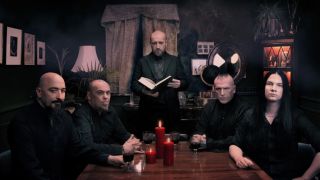Paradise Lost are experts in the field of gloom. Formed in 1988 in the north of England, the band helped establish a new lineage for British doom metal as part of the 'Peaceville Three' whilst also laying claim to being the band that coined the term gothic metal. "It was in an interview with Phil Alexander for Raw magazine in 1989," PL guitarist Gregor Mackintosh says matter-of-factly. "He said ‘you’re not really metal, you’re not really gothic so what are you?’ and Nick [Holmes, Paradise Lost vocalist] said ‘call us gothic metal then’. It wasn’t us asserting ourselves or anything – it was just an off-the-cuff remark."
The lack of fanfare is fitting not just for the genre, which maintains a permanent icy cool demeanour, but also for a band who have spent over three decades quietly flourishing in Britain's underground metal scene. Don't be fooled though; Paradise Lost's contribution to the birth and evolution of goth metal is immense. The band's 1991 record Gothic crystalised the meeting of worlds, as 80s goth collided with death-doom in a thundering yet morose package.
"We were between a rock and a hard place in 1991, at least so far as the scene went," Mackintosh explains. "The bands we were used to touring with were all of an ilk – there was massive variation within, but when you’ve got bands like Napalm Death, Autopsy, Bolt Thrower and Extreme Noise Terror, we really started to not fit in with that. Gothic was instrumental in how Paradise Lost moved forward into making goth metal. At the time we weren’t putting too much thought into it, we just mixed styles of music we enjoyed and some people dug it. We were just exploring our love for bands like The Sisters Of Mercy and Celtic Frost."
As the progenitors for a genre that exploded in the mid-90s and has enormously shaped metal culture since, we asked Mackintosh to pick out the 10 records that he thinks shaped goth metal's evolution.
"We helped birth a genre, but it was by accident!" Mackintosh says. "It took a while to take off and some bands got there before us. We were on a precipice and didn’t really know how things were going to go, but we weren't afraid - just excited."

1. Christian Death – Only Theatre Of Pain (1982)
"I wouldn't call Christian Death metal by any stretch, but they were definitely goth! They had a huge influence on some of the early metal bands that started incorporating those goth elements. The main reason this band are here is because a big part of this list is about what I see is the pathway where goth and metal fused.
"I got into the album Only Theatre Of Pain in the early-to-mid 80's and loved the over the top despondency of it all. It wasn't until Celtic Frost brought out Into The Pandemonium in '87 that I realised metal bands could be directly influenced by goth, as certain parts of that record are heavily influenced by Christian Death – to dramatic effect!"
2. The Cult – Love (1985)
"Again, The Cult aren't really metal as such, but from when I was very young I got really invested in following their transition from the gothic music of Southern Deathcult through to their stadium rock and sometimes metal in The Cult. The main problem you tend to have with The Cult is that when they were at their most gothic they'd lose their metal side and vice versa, making it really hard to pick an album out!
"That said, they were such a big part in how those scenes overlapped and came together, as well as being extremely instrumental in Paradise Lost’s music and also probably in later bands like Stillborn. On a personal level, I found this transition very inspiring when writing our Icon and Draconian Times albums. They were also connected to the area where I grew up much in the same way The Sisters of Mercy were, where it wasn't uncommon to find someone who used to go drinking with Andrew Eldritch or lived with Ian Astbury."
3. Celtic Frost – Into The Pandemonium (1987)
“Right upfront I’ll say, this doesn’t class as gothic metal but it is absolutely and definitely proto-gothic metal. It made Paradise Lost what we are and so many other bands in the scene too. Tom [G. Warrior, Celtic Frost’s vocalist] liked to call it avant-garde metal, but there were undeniable gothic influences in there. You look at the song Mesmerized and a few others, he’s taken the vocals from Rozz Williams of Christian Death.
"At that point, nobody in the metal scene would really pick out those Christian Death elements, but I immediately did. I loved Celtic Frost for so many reasons, not least being because of the way they played at that point; if they were as tight in how they played as a band like Slayer, they probably wouldn’t have experimented in the way they did.”
4. Stillborn – Necrospirituals (1989)
"When I first heard Stillborn’s Necrospirituals I was blown away. They were a Swedish band and at the time nobody really knew anything about them – in the UK at least. Necrospirituals existed almost completely under the radar and only a few scene heads knew about them at the time, because you couldn’t put an order in at Shades Record Store or anything, you could only get it by trading.
"I got a copy from Lee Dorrian of Cathedral, then still in Napalm Death when we were tape trading. It was like ‘wow, this guy’s voice…’ because this was well before Peter Steele and was clearly Andrew Eldritch-inspired, but chewed down and with these over-the-top heavy metal guitars on top. It was hugely inspirational – the singer’s voice made him sound like he was going to be 50-foot tall."
5. Samhain – Final Descent (1990)
“I think Samhain’s Final Descent is the first time goth and metal truly crossed over, just not necessarily in the way people would expect. It was a more revved-up version of early goth and you can hear it in Glenn Danzig’s voice, this over the top take of the gothic style in a line that runs right back to something like Siouxsie And The Banshees.
"It did more for people’s perceptions of the differences and similarities between goth and rock/metal than a lot of the more obvious records that came later could. Danzig is considered a bit of a goth icon now, but I think that’s been applied retrospectively. From our perspective, gothic metal was this dour and sombre music, but I don’t think either of those tags can necessarily be applied to Samhain.”
6. The Sisters Of Mercy – Vision Thing (1990)
"There are some incredibly metal parts to Vision Thing. Eldritch might never admit it – he hated the word goth and getting lumped in with it – but you don’t get more gothic than The Sisters Of Mercy. I think he got into a lot of showy metal coming from LA and the Sisters aspired to do some of that. It steered the ship into uncharted waters, but it also brought people together as a lot of metal fans and goth fans can see eye-to-eye because of albums like Vision Thing.
"Them being a local band was almost irrelevant to Paradise Lost, but you became aware of all these stories that became almost folklore-ish. It was a fairly big movement in Leeds at the time, but the fact I was around it every Friday and Saturday night, made it part of our everyday existence."
7. Type O Negative – Bloody Kisses (1993)
“I think this goes hand-in-hand with something like Gothic but leans more towards the tongue-in-cheek side of things. Peter was into the same music I was, but he loved to take the piss out of it all. That is what Bloody Kisses is – a massive piss-take but done in a classic and massive-sounding way that could draw on goth, metal and even stuff like Eels.
"Its success didn’t really surprise me – Peter sent me an advance copy before it came out and immediately I was like, ‘Bloody hell this is good’. It was more accessible than the first record, but the surprising thing for me was they became massive off the back of a tour I was sure was going to destroy them. They signed up for the Motley Crue tour and became massive from it – something I still don’t fully understand! They then went on to do even more with October Rust, which was like a more mature version of what they'd done originally with Bloody Kisses.”
8. Paradise Lost – Draconian Times (1995)
“Draconian Times really re-shaped my life. It was the first time I saw gothic metal go to the masses in the way it did, particularly in Europe. We did really well with [1993 Paradise Lost album] Icon, then straight after we were asked out on tour with Sepultura during the Chaos A.D. era, then MTV picked us up like nobody’s business. Draconian Times came off the back of that and pushed us onto a whole new level, but also helped gothic metal gain widespread acknowledgement.
"That’s not me being big-headed necessarily, it’s something that bands we inspired have directly told us. It’d be annoying, if we weren’t so proud of it! It was weird playing it in full at Bloodstock, if mainly because it was the first gig we’d done in however long. We had no rehearsals and we hadn’t played it in its entirety in a while so it felt like ‘let’s see what happens’.”
9. Deathstars – Synthetic Generation (2003)
“I remember hearing one of Deathstars’ songs on MTV around the time Synthetic Generation came out. I loved the sound of it – they were doing goth metal in a different way to everybody else, going outside the boundaries. It’s funny because some of the original goth bands took a similar approach in their early days, bands like Alien Sex Fiend. It was refreshing and interesting, so we got them to support us on tour and became friends.
"There's been bands I’ve heard since that have done a similar thing but Deathstars were the first I heard doing it from the metal perspective and really making waves with it. I was shocked hearing things like vocoders into the record, taking these things that could be seen as really cheesy but came across as entirely honest.”
10. Tribulation – Children Of The Night (2015)
“I got into Tribulation in a very similar way to how I found Deathstars. I heard one track somewhere and so I asked if they could support us and they did. I just love their take on how goth and metal should mix. They do it in a much more flowery way, but not in the same flowery way a band like Nightwish or the more symphonic bands do.
"It was more in the instrumentation – they’re great musicians but never overplay, so you can hear all kinds of things in there like Thin Lizzy or Fields Of The Nephilim. It’s another take and viewpoint on the gothic metal mix. I don’t know if they call themselves gothic metal, but they do it in a way that really stands out. It really struck a chord with me.”
Paradise Lost play Gothic in full at Damnation Festival 2021.
The Lost And The Painless six-disc box set is due November 26 via Peaceville


